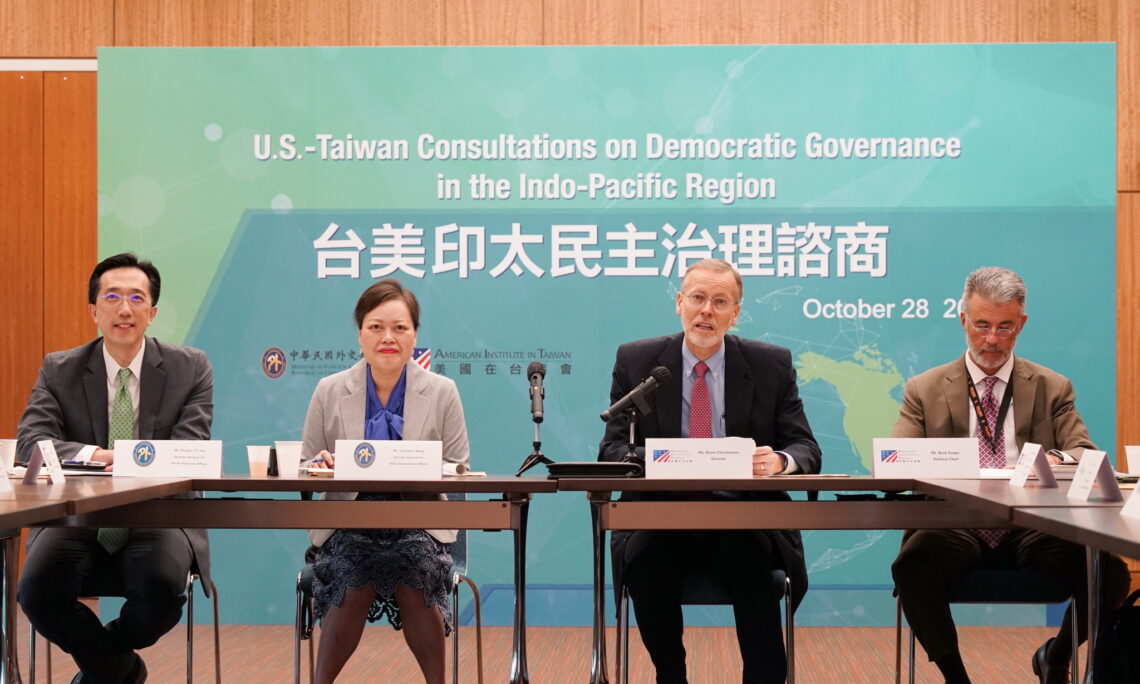OT-2046
October 28, 2020
Remarks by AIT Director W. Brent Christensen at the Capstone Session
of the 2020 U.S.-Taiwan Consultations on Democratic Governance in the Indo-Pacific Region
October 28, 2020
(as prepared for delivery)
Thank you to everyone for joining us today here in Taipei and online from Washington and elsewhere to conclude this year’s U.S.-Taiwan Consultations on Democratic Governance in the Indo-Pacific Region.
Assistant Secretary Destro, it is a real pleasure to see you again so soon, albeit virtually. I want to highlight that while your visit last month was focused on honoring the late President Lee Teng-hui, it was also the first visit to Taiwan by a U.S. Assistant Secretary of State for Democracy, Human Rights, and Labor, so that in itself was an important breakthrough.
But even before that visit, you were already well-known here in Taiwan, both as the highest ranked U.S. official to participate in a GCTF workshop and for your op-ed in China Times last April about how Taiwan’s democratic values informed its COVID-19 response.
I know you had many fruitful conversations while in Taipei, including those with our colleagues from the Ministry of Foreign Affairs – Directors General Wang and Hsu – who are joining us again today, as well as with a number of Taiwan-based non-governmental organizations, human rights defenders, and democracy activists.
But these consultations would not be complete without committing to concrete next steps towards fostering sustainable, long-term partnerships between U.S. and Taiwan civil society. That is the theme of today’s event. I look forward to hearing your ideas about what more our governments can do to empower civil society efforts.
Civic and community organizations are at the very heart of Taiwan’s vibrant democracy and have played crucial roles in Taiwan’s laudable achievements in the field of good governance and human rights. Thanks to each of you for your personal contributions.
Likewise, U.S. efforts to promote democracy and fundamental freedoms abroad would be moribund without our civil society partners. These values, shared in common by the United States, Taiwan, and other democratic societies, are crucial to advancing a free and open Indo-Pacific.
And so I hope through today’s conversations, we can explore how to further enable our partners in Taiwan to shine the light of democratic freedoms even more brightly across the region and beyond.
Johanna, Manpreet, thank you for the International Republican Institute and National Democratic Institute’s willingness to contribute to this endeavor. I look forward to future collaboration between the American Institute in Taiwan, the newly-announced Taipei offices of NDI and IRI, and our existing civil society partners in Taiwan.
Lynn, I wish the National Endowment for Democracy great success in working with the Taiwan Foundation for Democracy and Forum 2000 for what will surely be a landmark event next year.
Our time together today is brief, so let me just conclude by noting my commitment to expanding the ability of Taiwan’s 23 million active citizens to contribute more actively to a better, freer, and more democratic future for the Indo-Pacific region, and the world.
Real friends, real progress – 真朋友,真進展 – is not just about advancing U.S.-Taiwan ties. It’s about supporting Taiwan’s role on the international stage.
And so I’m pleased to hand over the microphone so we can hear from my good friend, Foreign Minister Joseph Wu.
Thank you very much.
















![Video Thumbnail [Recovered]-01](../wp-content/uploads/sites/269/Video-Thumbnail-Recovered-01-1-750x450.jpg)





